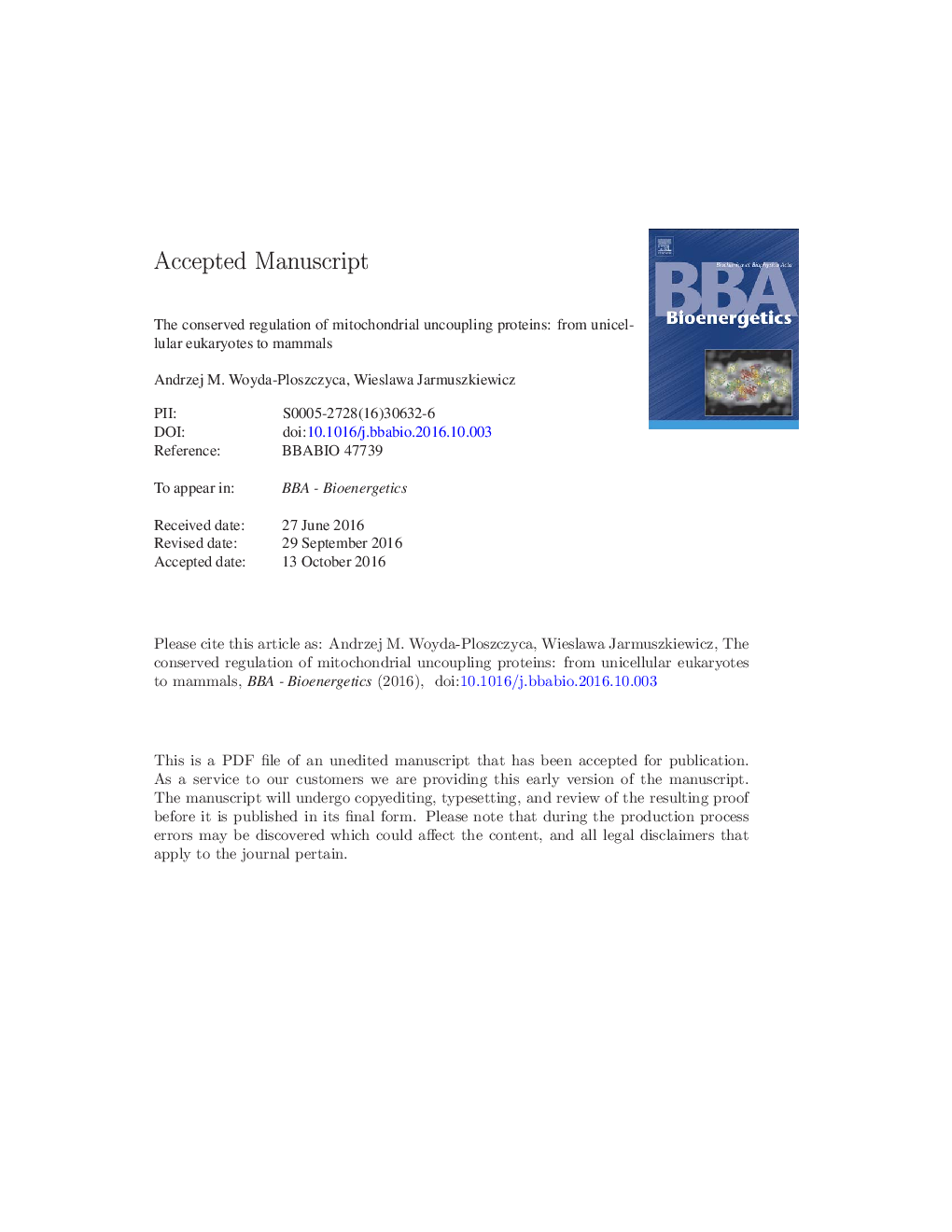| کد مقاله | کد نشریه | سال انتشار | مقاله انگلیسی | نسخه تمام متن |
|---|---|---|---|---|
| 5507165 | 1400315 | 2017 | 41 صفحه PDF | دانلود رایگان |
عنوان انگلیسی مقاله ISI
The conserved regulation of mitochondrial uncoupling proteins: From unicellular eukaryotes to mammals
ترجمه فارسی عنوان
مقررات محافظت شده از پروتئین های جدا سازی میتوکندری: از یوکاریوت های تک سلولی به پستانداران
دانلود مقاله + سفارش ترجمه
دانلود مقاله ISI انگلیسی
رایگان برای ایرانیان
کلمات کلیدی
CarboxyatractylosideQoXCATRHNEFFAOXPHOSBATANT4-hydroxy-2-nonenal - 4-هیدروکسی-2 غیرنالROS - ROSAldehydes - آلدئیدFree fatty acid - اسید چرب آزادFree fatty acids - اسیدهای چرب آِزادbrown adipose tissue - بافت چربی قهوه ایadenine nucleotide translocase - ترانسکوز نوکلئوتید آدنینUncoupling proteins - جدا کردن پروتئین هاRAL - رالOxidative phosphorylation - فسفوریلاسیون اکسیداتیوMitochondria - میتوکندریاPurine nucleotide - نوکلئوتید پورینPurine nucleotides - نوکلئوتید پورینAll trans-Retinoic Acid - همه اسیدهای trans-retinoicMitochondrial membrane potential - پتانسیل غشای میتوکندریCoenzyme Q - کوآنزیم QReactive oxygen species - گونههای فعال اکسیژن
موضوعات مرتبط
علوم زیستی و بیوفناوری
علوم کشاورزی و بیولوژیک
دانش گیاه شناسی
چکیده انگلیسی
Uncoupling proteins (UCPs) belong to the mitochondrial anion carrier protein family and mediate regulated proton leak across the inner mitochondrial membrane. Free fatty acids, aldehydes such as hydroxynonenal, and retinoids activate UCPs. However, there are some controversies about the effective action of retinoids and aldehydes alone; thus, only free fatty acids are commonly accepted positive effectors of UCPs. Purine nucleotides such as GTP inhibit UCP-mediated mitochondrial proton leak. In turn, membranous coenzyme Q may play a role as a redox state-dependent metabolic sensor that modulates the complete activation/inhibition of UCPs. Such regulation has been observed for UCPs in microorganisms, plant and animal UCP1 homologues, and UCP1 in mammalian brown adipose tissue. The origin of UCPs is still under debate, but UCP homologues have been identified in all systematic groups of eukaryotes. Despite the differing levels of amino acid/DNA sequence similarities, functional studies in unicellular and multicellular organisms, from amoebae to mammals, suggest that the mechanistic regulation of UCP activity is evolutionarily well conserved. This review focuses on the regulatory feedback loops of UCPs involving free fatty acids, aldehydes, retinoids, purine nucleotides, and coenzyme Q (particularly its reduction level), which may derive from the early stages of evolution as UCP first emerged.
ناشر
Database: Elsevier - ScienceDirect (ساینس دایرکت)
Journal: Biochimica et Biophysica Acta (BBA) - Bioenergetics - Volume 1858, Issue 1, January 2017, Pages 21-33
Journal: Biochimica et Biophysica Acta (BBA) - Bioenergetics - Volume 1858, Issue 1, January 2017, Pages 21-33
نویسندگان
Andrzej M. Woyda-Ploszczyca, Wieslawa Jarmuszkiewicz,
